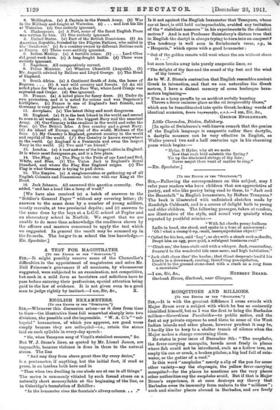ENGLISH HEXAMETERS.
[To TIM EDITOR Or TIER " SPECTATOR...1
SIR,—Whenever this discussion arises—as it does from time to time—the illustrative lines fall somewhat sharply into two divisions, the possible and the impossible. " W. A. C.'s""col- lognial" hexameters, of which you approve, are good verse simply because they are colloquial—i.e., retain the stress laid on each syllable in every-day speech :
" Sir, when Tennyson sang of Virgil's stateliest measure," &c. But W. J. Stone's lines, as quoted by Mr. Lionel James, are impossible, because violence is done in them to the natural stress. The line
"And may they from above grant thee thy every desire," is a pentameter, if anything, but the initial foot, if read as prose, is an iambus both here and in " Than when two dwelling in one abode are at one in all things." The metre is commonly vitiated by such forced stress on a naturally short monosyllable at the beginning of the line, as in Coleridge's translation of Schiller : "In the hexameter rises the fountain's silvery column. . . ."
Is it not against the English hexameter that Tennyson, whose ear at least is still held unimpeachable, avoided any imitation of the " stateliest measure " in his experiments-in the classical metres P And is not Professor Saintsbury's dictum true that in English the dactyl is always trying to turn into an anapaest P The tendency is well seen in Swinburne's verse, e.g., in " Hesperia," which opens with a good hexameter :
" Out of the golden remote wild west where the sea without shore is . . ."
but soon breaks away into purely anapmstic lines, as "The delight of thy face and the sound of thy feet and the wind of thy tresses.'
As to W. J. Stone's contention that English resembles ancient Greek in intonation, and that we can naturalize the Greek metres, I have a distant memory of some burlesque hexa- meters beginning-
" E'en as a lamp paraffin by an accident awfully bursting Throws a fierce ominous glare as the oil irrepressibly blazes," which can be transliterated into quite Greek-looking words of identical scansion, .g
.,vacra Aapxopas*, tr.T.A.--I am, Sir, &c.,
GEORGE ENGLEREART.
Little Clarendon, Dinton, Salisbury.
[In spite of Swinburne's well-known remark that the genius of the English language is anapaestic rather than dactylic, a dactylic measure can be very effective in English, as Waller proved two and a half centuries ago in his charming poem which begins :— " Hylas, 0 Hylas, why sit we mute Now that each bird saluteth the Spring ? Tie up the slackened strings of thy lute; Never mayst then want of matter to sing."
—ED. Spectator.]


































 Previous page
Previous page